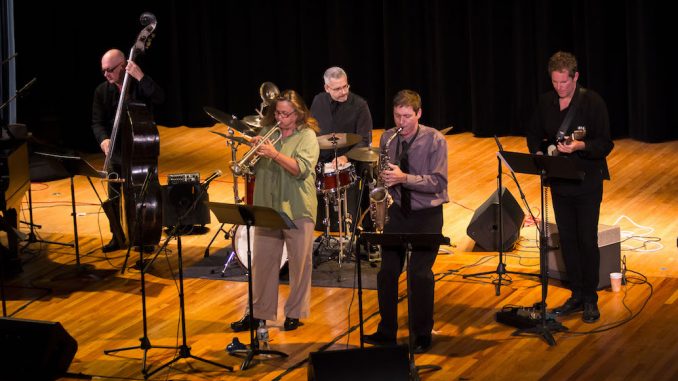
On Tuesday, Sept. 27, the music department held a faculty jazz showcase in Studley Theatre. The showcase featured a mix of standards and original pieces written by the professors.
“We all brought in our own tunes that we picked from a repertoire that we enjoyed playing,” said upright bassist John Menegon.
The show opened with the slow, moody “Infant Eyes,” originally written by saxophonist Wayne Shorter in the mid-1960s about the birth of his infant daughter Miyako. “Brazilian Coffee,” an original piece by pianist Larry Ham, was second on the program; it’s not quite a bossa nova piece, despite what the title may suggest, but Ham’s piano was imbued with the spirit of the South American jazz variant nonetheless.
Following that was “I Don’t Stand a Ghost of a Chance With You,” written by Victor Young with lyrics by Bing Crosby and Ned Washington. Original lyrics were also contributed by professor/vocalist Teri Roiger in the form of “vocalese,” a style of jazz singing in which instrumental solos serve as a melodic frame for vocals. In “I Don’t Stand a Ghost of a Chance With You,” Roiger sings in the stead of Young’s saxophone solo.
Roiger continued to sing on the next tune, “The Nearness of You” — written by Hoagy Carmichael with lyrics by Ned Washington — which she described as “near and dear” to her.
“I’ve been singing this song for a very long time,” she explained. “There’s just something about the way it’s written and the lyrics, how everything works together; it makes me feel very emotional. This one just strikes a chord in my heart. It creates a lot of visual stuff for me, and I think about … people.”
“Pull It Together” was the second original piece of the night, written by trumpeter Rebecca Coupe Franks. The triumphant, slightly bittersweet piece came to Franks, she explained, while she was “a little frustrated” with gridlock traffic. Percussionist Jeff Siegel’s original “Ballad of the Innocent,” from his upcoming South African-inspired album, was a slow and somber tribute to victims of violence across the globe.
The atmosphere of the show livened up with the band’s jazz fusion-inspired cover of Eddie Harris’s piece “Freedom Jazz Dance.”
The 1965 standard’s sense of momentum was preserved in this reinterpretation, but the blues and funk influence in the guitar playing gave the piece a decidedly more modern aesthetic.
Herbie Hancock’s “Maiden Voyage” allowed further reinterpretation on the band’s part.
“We’ve all played the piece before, but we took a slightly different approach to it,” Menegon said. “There was a lot more interaction between each musician. We could enhance certain elements, specifically rhythmically. Basically, we could paint our own picture.”
The show closed out with a rendition of “Straight, No Chaser” by legendary jazz pianist Thelonious Monk. It served as an explosive, all-inclusive finale that saw every instrument, including the melodica (brought out only for the final tune), had its moment to shine. The tune also utilized one of jazz’s oldest vocal traditions in the form of scat singing, said to have been invented during the 1910s or 1920s.
Tradition was key here, as the music selection reflected decades of change across the jazz landscape. Between the solid original works and the reinterpreted classics, the faculty showed a keen understanding of jazz history as well as the boldness to view it through alternative lenses.
